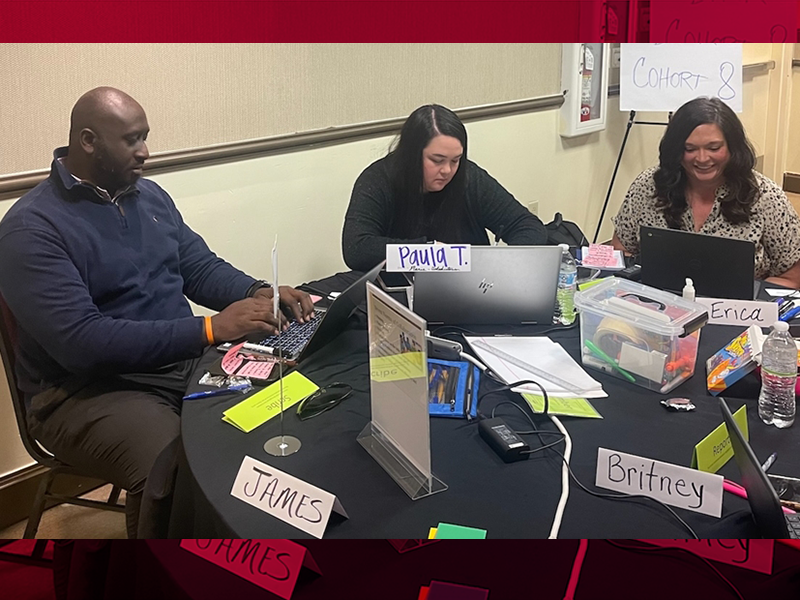
Cassie King's introduction to the College of Education and Health Professions' IMPACT Arkansas Principal Fellows Program came in the form of an unexpected referral. King, who is a Spanish teacher at Clarendon High School in Eastern Arkansas and is not related to the founders of the Carl B. & Florence E. King Foundation, had been researching various graduate principal preparation programs when she was told she would make a great IMPACT fellow.
"I have worked in education for 15-plus years, and I wanted to continue to learn and grow," King said. "This program was exactly what I was looking for."
King's leadership potential was spotted by Kelsey Riley, the teacher center coordinator at Great Rivers Education Cooperative in Helena, which supports students in membership schools by providing support services that enhance educators' teaching, learning and leadership skills.
The IMPACT Arkansas Principal Fellows program has helped build leadership capacity in high-needs, rural Arkansas schools for nearly a decade with the support of the Walton Family Foundation. The College of Education and Health Professions partnered with the foundation in 2014 to launch IMPACT, and their support has helped graduate fellows from seven cohorts thus far.
This year, the college received additional funding from the Windgate Foundation and the Carl B. & Florence E. King Foundation. The King Foundation's gift was given to provide support to fellows specifically from rural Eastern Arkansas counties, allowing Cassie King and four other educators to take advantage of expanded sponsorship funds to participate in IMPACT's current cohort - the eighth since the program started in 2014 - and advance their leadership skills while earning a graduate degree from the U of A.
IMPACT's profound ability to transform educators into leaders is evident in fellows like Erica Box, a third-grade teacher at McGehee Elementary.
"IMPACT has already changed my life," Box said. "The relationships I've made with my cohort eight members and the experiences we've already shared are sure to go down as some of the best of my life."
At the heart of the program is a focus on experiential learning. Providing fellows with an education they can take and apply in their classrooms is something program mentors strive to achieve.
James Copeland, an English Language Arts teacher at Marvell-Elaine High School, is already sharing IMPACT teachings and strategies with other leaders in his school, just several months into the program.
"We share information, strategies, encouragement and understanding, and because we serve students with similar backgrounds and demographics, we are among the best to help figure out how to address challenges unique to our situations," Copeland said.
When fellows graduate, they join a rich and intricate network of IMPACT alums equally as dedicated to bettering schools in Arkansas as they are. Acceptance into IMPACT comes with a commitment from fellows to remain in their current school for two years post-graduation. More than 85% of graduated IMPACT fellows remain in high-poverty schools today.
Meredith Jeter is a dyslexia supervisor for the Stuggart School District and has received two degrees and an endorsement from the U of A. She decided to apply to IMPACT, her fourth program with the university, to gain leadership skills along with personal and professional growth.
"My experience at the university was extraordinary in all three programs I've completed, and I was sure this program would be nothing short of that," Jeter said.
She's already developed a personal mission statement with the help of her IMPACT teachings. She plans to "promote positive change, enhance student success, develop future leaders and lead with integrity" after graduating.
The new King Foundation grant represents an extension of the foundation's mission to give to causes that create future opportunities and those that "put shoes on people's feet."
"The generous King Foundation grant has empowered IMPACT to refocus our effort on building a leadership pipeline for high-poverty schools in the Arkansas Delta," said John Bacon, executive director of IMPACT. "The communities served through these funds have traditionally struggled to recruit, develop and retain high-quality leaders for their schools, but by partnering with the IMPACT team, they now have a framework for identifying and supporting talent to grow the next generation of school leaders."
As additional funding allows the program to keep growing, so do the ranks of IMPACT graduates actively making a real difference in schools across the state. Since 2014, IMPACT has recruited 146 aspiring school leaders, serving 124 high-poverty schools in 88 Arkansas public school districts and eight charter schools.
Sonja McKinney, a guidance counselor at Lee High School currently enrolled in IMPACT, cites the help network and lessons centered around empathy as the highlights of her education so far. She's already implementing these strategies with her students and is aspiring to exciting leadership roles, like becoming "a vice principal or dean of students" after earning a master's degree in educational leadership from the U of A.
Now, months into their IMPACT journey, Cassie King and the rest of the fellows are starting to develop a sense of the fundamental change they can enact across eastern Arkansas.
"The other fellows are all extraordinary educators dedicated to serving their students and pushing them to achieve their best," she said. "I'm fortunate to journey alongside them as we work separately, yet together, to improve education in the Delta region of Arkansas."
Contacts
Sean Rhomberg, assistant director of communications
College of Education and Health Professions
479-575-7529,